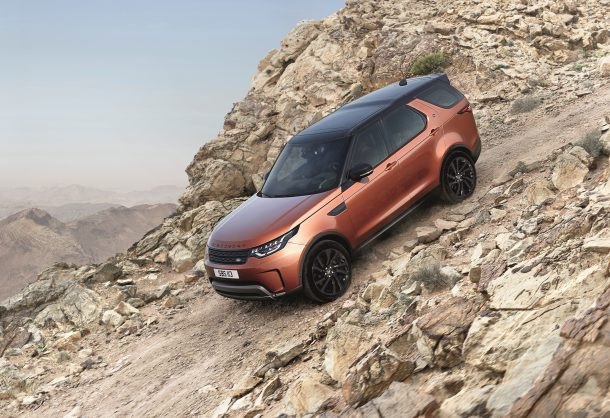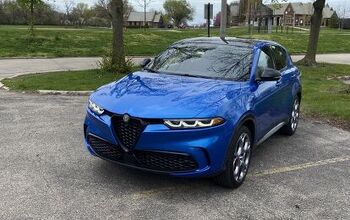Land Rover's Design Boss Is Okay With the Idea of Branching Into Car-like Models

Call it a case of thinking out loud, or perhaps the spark that could propel a company in a new and potentially disastrous direction.
Either way, Land Rover and Range Rover’s design chief, Gerry McGovern, is pretty open-minded about a future where a British automaker famous for making utility vehicles — and only utility vehicles — spawns a car-like model or two. And by open-minded, we mean in a first-year university kind of way.
McGovern made the comments during a question and answer session with media today during the Land Rover Discovery launch in Utah, Car Advice reports. Speaking about the automaker’s future, he claimed that both brands have reputations solid enough to weather new models that don’t quite reach the bar set by past and present offerings.
The time has never been better to diversify products in the hope of attracting new buyers in new segments, but the automaker finds itself in an unusual position. Right now, most companies are desperately attempting to field more utility vehicles. Land Rover and Range Rover has that field covered, but the lineup doesn’t drop below the Land Rover Discovery Sport and Range Rover Evoque in terms of size, nor does it get any wilder than the latter’s let’s-see-if-this-flies convertible variant.
“If you look at how other brands have come into this SUV territory, why couldn’t Land Rover, Range Rover go into that territory?” McGovern asked. “The thing about Range Rover is, it has massive [brand] equity. It has equity comparable to certain fashion brands, not because it’s fashionable but because of the margin.”
It’s unlikely that the automaker behind the Defender would ever consider a sedan, let alone some sort of sports car, but high-growth areas exist far down the segment ladder. Subcompact CUVs are hot, and the only British competition faced by Mercedes-Benz’s GLA comes from Mini’s Countryman.
The SUV market is “fragmenting” into new niches, McGovern said, and pursuing one of those segments could pay off. If done right, that is.
“We have got a specific DNA which has evolved over the years and its about taking that DNA and those ingredients and cooking them up in a way that is absolutely relevant,” said McGovern. “All the vehicles that we create now need to sell a certain volume so we can get that investment back and reinvest it in the future. We are never going to be about massive volume but we need to get to critical mass so we can sustain ourselves.”
Assuming there are smaller, utility-minded models in Land Rover’s future, a certain level of off-roadability would help keep the automaker’s reputation more or less intact. Whether the public can handle another drop-top seems less likely.
[Image: Jaguar Land Rover]

More by Steph Willems
Latest Car Reviews
Read moreLatest Product Reviews
Read moreRecent Comments
- W Conrad I'm not afraid of them, but they aren't needed for everyone or everywhere. Long haul and highway driving sure, but in the city, nope.
- Jalop1991 In a manner similar to PHEV being the correct answer, I declare RPVs to be the correct answer here.We're doing it with certain aircraft; why not with cars on the ground, using hardware and tools like Telsa's "FSD" or GM's "SuperCruise" as the base?Take the local Uber driver out of the car, and put him in a professional centralized environment from where he drives me around. The system and the individual car can have awareness as well as gates, but he's responsible for the driving.Put the tech into my car, and let me buy it as needed. I need someone else to drive me home; hit the button and voila, I've hired a driver for the moment. I don't want to drive 11 hours to my vacation spot; hire the remote pilot for that. When I get there, I have my car and he's still at his normal location, piloting cars for other people.The system would allow for driver rest period, like what's required for truckers, so I might end up with multiple people driving me to the coast. I don't care. And they don't have to be physically with me, therefore they can be way cheaper.Charge taxi-type per-mile rates. For long drives, offer per-trip rates. Offer subscriptions, including miles/hours. Whatever.(And for grins, dress the remote pilots all as Johnnie.)Start this out with big rigs. Take the trucker away from the long haul driving, and let him be there for emergencies and the short haul parts of the trip.And in a manner similar to PHEVs being discredited, I fully expect to be razzed for this brilliant idea (not unlike how Alan Kay wasn't recognized until many many years later for his Dynabook vision).
- B-BodyBuick84 Not afraid of AV's as I highly doubt they will ever be %100 viable for our roads. Stop-and-go downtown city or rush hour highway traffic? I can see that, but otherwise there's simply too many variables. Bad weather conditions, faded road lines or markings, reflective surfaces with glare, etc. There's also the issue of cultural norms. About a decade ago there was actually an online test called 'The Morality Machine' one could do online where you were in control of an AV and choose what action to take when a crash was inevitable. I think something like 2.5 million people across the world participated? For example, do you hit and most likely kill the elderly couple strolling across the crosswalk or crash the vehicle into a cement barrier and almost certainly cause the death of the vehicle occupants? What if it's a parent and child? In N. America 98% of people choose to hit the elderly couple and save themselves while in Asia, the exact opposite happened where 98% choose to hit the parent and child. Why? Cultural differences. Asia puts a lot of emphasis on respecting their elderly while N. America has a culture of 'save/ protect the children'. Are these AV's going to respect that culture? Is a VW Jetta or Buick Envision AV going to have different programming depending on whether it's sold in Canada or Taiwan? how's that going to effect legislation and legal battles when a crash inevitibly does happen? These are the true barriers to mass AV adoption, and in the 10 years since that test came out, there has been zero answers or progress on this matter. So no, I'm not afraid of AV's simply because with the exception of a few specific situations, most avenues are going to prove to be a dead-end for automakers.
- Mike Bradley Autonomous cars were developed in Silicon Valley. For new products there, the standard business plan is to put a barely-functioning product on the market right away and wait for the early-adopter customers to find the flaws. That's exactly what's happened. Detroit's plan is pretty much the opposite, but Detroit isn't developing this product. That's why dealers, for instance, haven't been trained in the cars.
- Dartman https://apnews.com/article/artificial-intelligence-fighter-jets-air-force-6a1100c96a73ca9b7f41cbd6a2753fdaAutonomous/Ai is here now. The question is implementation and acceptance.


































Comments
Join the conversation
No wonder RR has a reputation for poor reliability, their management is f***ing retarted. The company currently doesn't offer a single off-road vehicle, every vehicle is car-like or designed completely off of a car based architecture. I mean are we talking a sports car like car? A Subaru type car? Doesn't general statistical trends indicate those markets are dying? How much further can they make their vehicles car-like? Specific DNA my behind.
Mercedes, BMW and Porsche have all very successfully and profitably built vehicles seemingly at odds with their traditional market niches. Self styled brand purists moan and groan, but the business does just fine. Land Rover has room to expand!